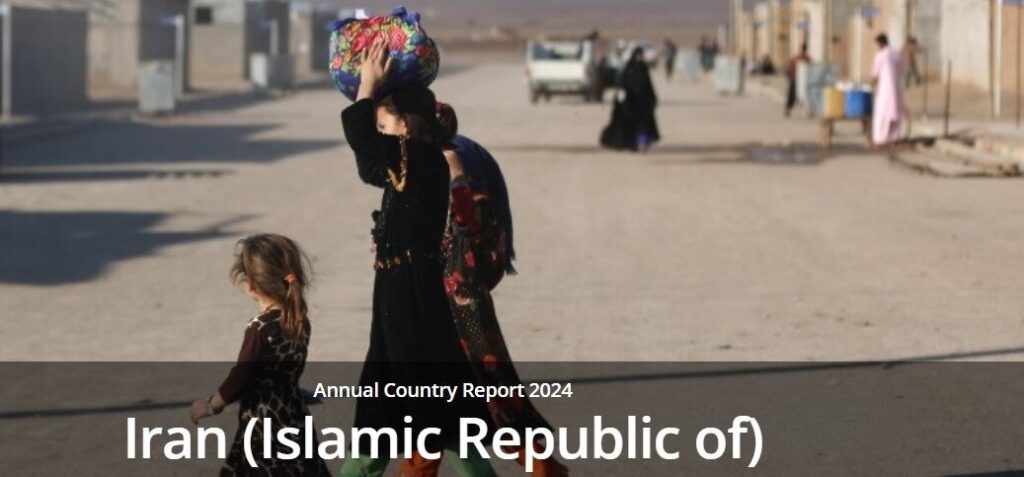Tehran -The World Food Program (WFP) has released a 2024 report on Iran based on the Provisional State Strategic Plan (ICSP 2023-2027).
In 2024, WFP provided a combination of in-kind and cash assistance to address the food needs of more than 33,000 vulnerable refugees in Iran. As a result, 70% were able to consume food at acceptable levels. This remains almost stable compared to the previous year.
Since August, WFP has increased the value of cash transfer eligibility by 25% and has actively helped to alleviate the immediate economic challenges reported by refugees.
The WFP has maintained its presence in Iran since 1987, focusing primarily on addressing the food security needs of refugees from Afghanistan. Iran has hosted refugees for over 40 years. Most refugees live in urban, urban and rural areas, often integrated with host communities, along with people in refugee-like circumstances. However, the most vulnerable refugees living in 20 settlements in 13 states face a volatile food security situation that requires ongoing humanitarian assistance from the WFP.
WFP provided eligible refugees living in their residences with food assistance, education support and livelihood opportunities through physical food distribution, unconditional cash transfers and capacity building initiatives.
Given the economic situation in Iran in recent years, Afghan refugees face many challenges, particularly among the people of the settlement, including a decline in income opportunities and a decline in purchasing power that have affected food security and well-being. In response, WFP coordinated the Provisional National Strategic Plan (ICSP 2023-2027) by changing cash qualifications and food, adjusting the number of beneficiaries, extending the ICSP for two years and extending the UN Sustainable Development Framework for two years, and ensuring the support of UNSDF 2023-2027, as needed.
The WFP carried out activities under the ICSP to maintain support for these refugees and address the increased humanitarian needs of these refugees. Living in 20 villages in 13 Iranian provinces, around 35,000 most vulnerable documented refugees benefiting from the food aid provided by WFP.
WFP distributes fortified flour, fortified vegetable oil and cash-based relocations to approximately 33,000 beneficiaries each month, with an average support period of approximately 30 days. Post-distribution monitoring (PDM) reports show that 70% of beneficiaries can consume food at acceptable levels. This represents a nearly 4% decline compared to the previous year, but highlights the importance of WFP support and the increase in cash assistance that helps offset some of the losses in purchased electricity.
WFP Iran has incorporated a cash top-up component in its ICSP (2023–2027) for people living with disabilities. This strategic initiative was piloted in two large settlements in February 2023 and began to expand to additional settlements in early 2024. As of the end of December, the initiative had benefited 271 individuals, including 158 men and 113 women.
Under the school lunch program, WFP has reached approximately 8,700 refugee school children (51% of girls) attending primary and secondary schools, along with 650 Iranian teachers (30% of women). Nutritious snacks – milk combined with either a date bar or biscuit – distributed daily during the school year, aiming to enhance educational and nutritional outcomes.
According to the results of a qualitative study conducted by the Country Office on the impact of school feeding programs, school feeding programs have a positive impact on students’ learning abilities and physical health. Feedback from the school’s principals shows that since the programme has started, registration rates have also risen for both boys and girls. Additionally, parents have reiterated that since the programme has started, their children have become more motivated to attend school.
To promote the education of girls and reduce attendance barriers, approximately 2,850 girls at primary and secondary school levels received cash incentives as part of WFP’s commitment to empowering young women. Cash incentives are deposited in a bank card under the child’s own name and usually spend this incentive on paying internet costs as reported during stationery purchases and field monitoring visits.
WFP supported income generation activities tailored to the needs and demands of refugees with a particular emphasis on empowering women and girls. Three new revenue-generating projects (bag making workshops, beauty salons, barbershops) were launched in 2024, but since 2019 it has continued to benefit from the opportunities offered by WFP, increasing the resilience of the community, including greenhouses, tailoring, bag making, suits, welding, mushroom cultivation and baking.
With ample funding in 2024, WFP was generally able to carry out all activities without significant disruptions in support. Under the general food support program with unconditional resource transfers, beneficiaries received support for an average of 357 days per year. Similarly, the average duration of support for school lunch programs was not only slightly lower than planned for the actual 175-day period.
WFP did not respond to an Iranian emergency in 2024 as there were no major natural disasters requiring WFP intervention.
The Centre for Alien and Foreign Immigration (CAFIA) remained the WFP’s major government counterparts, ensuring effective coordination of refugee-related activities. The close cooperation between CAFIA and international organizations played a key role in addressing the needs of refugees and in implementing WFP interventions efficiently.
In 2024, WFP was actively engaged in major interagency platforms, including the United Nations Country Team (UNCT), the Regional Refugee Response Programme (RRP), and interagency working groups focusing on cash, livelihoods, education and protection. Collaboration with partners such as the United Nations High Commissioner for Refugees (UNHCR), Iran’s Red Crescent Association (IRCS), and international NGOs such as the Norwegian Refugee Council (NRC), and Coupo Radion E Sviluppo (CESVI) have rejected WFP’s efforts. Highlights of these partnerships included post-distribution monitoring with UNHCR and participation in diverse interagency initiatives to enhance coordinated responses and support for refugees.

